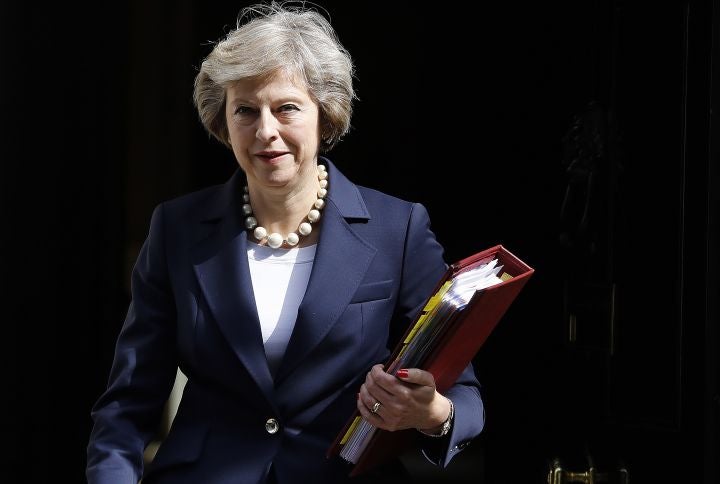Theresa May could start Brexit process without vote by MPs, Government lawyers reportedly say
'It sounds emphatic and that’s what we want to hear,' says Tory Leave campaigner of reports Prime Minister will use her own authority to trigger Article 50

Theresa May believes she can trigger the process that would lead to Britain's departure from the European Union without winning a vote in the House of Commons, according to a report.
Citing sources, The Daily Telegraph said Ms May had been told by Government lawyers that she could use her own executive power as Prime Minister to formally notify the EU that the UK was going to leave under Article 50 of the Lisbon Treaty.
This would start a process under which the Government would have a maximum of two years to negotiate the terms of Brexit before the UK left.
However lawyers and some politicians have claimed that parliament would have to repeal the 1972 European Communities Act, under which the UK joined the EU, before Article 50 could be triggered.

A Downing Street source told the Telegraph: “The Prime Minister has been absolutely clear that the British public have voted and now she will get on with delivering Brexit.”
A spokeswoman for Number 10 refused to confirm or deny the report.
The Act that created the EU referendum held in June did not say whether the result would be binding and it is therefore only advisory.
About 480 MPs, the vast majority, and most Lords have supported remaining in the EU.
Tory MP Bill Cash, a leading Brexit campaigner, welcomed the news about the reported Government legal advice, saying: “It sounds emphatic and that’s what we want to hear.
“There were people who are threatening to try and stop Brexit. The bottom line is that here is nothing that could possibly be allowed to stand in its way.
"Everyone in Europe is expecting it, the decision has been taken by the British people and that’s it. Let’s get on with it.”
Iain Duncan Smith, the former Work and Pensions Secretary, said on Friday that he was convinced the Government would start the process soon.
"I have spoken to them and I am definitely certain that these characters, David Davis, Liam Fox, and Boris Johnson, and the Prime Minister by the way, are very clear that they need to get on with triggering Article 50 as soon as possible early in the new year.
"When they do that, we will be bound on a course that means Britain will leave and I believe they are all very positive about the outcome that will entail. We will be out and we will do incredibly well."
If Britain fails to negotiate a separate deal after the two-year period allowed under the terms of Article 50 then trade with the EU will revert to World Trade Organisation rules.
It is not clear whether the UK could decide to stay in the EU after triggering Article 50, which says that the process must be carried out in accordance with the member state's own laws.
Shortly after the referendum, the leading QC Geoffrey Robertson told The Independent: "The 1972 communities act ... is still good law and remains so until repealed [by parliament].
"MPs are entitled to vote against it [Brexit] and are bound to vote against it, if they think it's in Britain's best interest [to vote that way]. It's not over yet.
"MPs will have to do their duty to vote according to conscience and vote for what's best for Britain. It's a matter for their consciences. They have got to behave courageously and conscientiously."
Join our commenting forum
Join thought-provoking conversations, follow other Independent readers and see their replies
Comments
Bookmark popover
Removed from bookmarks